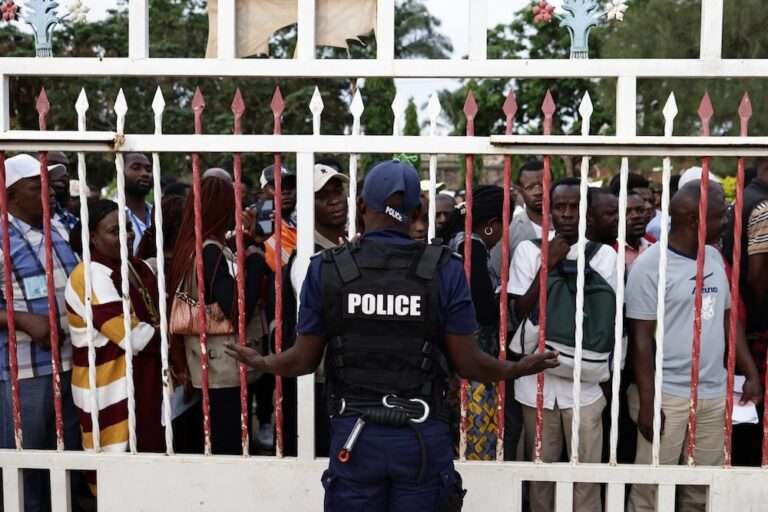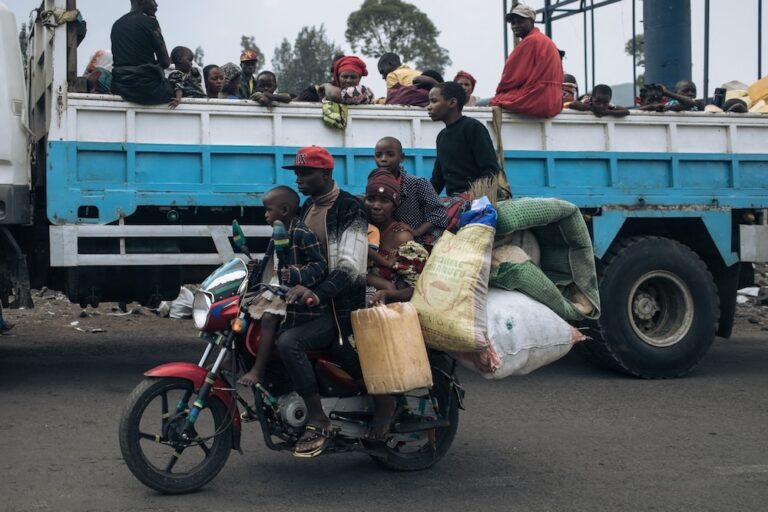(JED/IFEX) – The following is a 2 September 2000 JED letter to Dominique Sakombi Inongo, Minister of Communication for the Democratic Republic of Congo: Kinshasa, 2 September 2000 Mr. Dominique Sakombi Inongo Minister of Communication Kinshasa/Lingwala Your Excellency, Topic: The state of press freedom in the Democratic Republic of Congo In the name of the […]
(JED/IFEX) – The following is a 2 September 2000 JED letter to Dominique Sakombi Inongo, Minister of Communication for the Democratic Republic of Congo:
Kinshasa, 2 September 2000
Mr. Dominique Sakombi Inongo
Minister of Communication
Kinshasa/Lingwala
Your Excellency,
Topic: The state of press freedom in the Democratic Republic of Congo
In the name of the executive committee and all of the members of Journalists in Danger (Journaliste en danger, JED) we have the honour of congratulating you on the occasion of your appointment as Minister of Communication.
We are taking this opportunity to present to you an account of the state of press freedom in our country and to call on you to do everything in your power so that the situation improves.
To date, the Democratic Republic of Congo has the worst press freedom record in all of Africa. Ever since President Laurent-Desire Kabila took power in May 1997, our organisation has documented more than 110 cases of journalists who have been deprived of their freedom for varying amounts of time.
As you take possession of your new job, three journalists are in prison. One of them, Freddy Loseke Lisumbu la Yayenga, publisher of the La Libre Afrique newspaper, is in his ninth month of imprisonment in the Kinshasa Penitentiary and Re-education Centre (CPRK, formerly the Makala central prison). He was arrested on 31 December 1999, and tried and convicted by the Court of Military Order (Cour d’ordre militaire, COM) in May 2000 to three years in prison for “insulting the army” (“outrage à l’armée”.)
At the end of December 1999, Loseke had published two articles alluding to a plot hatched by an unidentified high-ranking officer of the Congo Armed Forces (FAC) against the President of the Republic. Before his trial began, Loseke was incarcerated in the Kokolo military camp in Kinshasa, where he claims to have been tortured. To this day, although Loseke is ill – he suffers from kidney disorders and reportedly has a paralysed leg – prison authorities refuse to allow him to receive medical attention in a hospital, as his lawyers want.
The two other imprisoned journalists are Emile-Aimé Kakese Vinalu, publisher of the newspaper Le Carrousel, and Jean-Pierre Ekanga Mukuna, publisher of the newspaper La Tribune de la Nation.
Kakese Vinalu was arrested in June 2000 and is being tried by the COM for “treason”. He had published in his newspaper three articles deemed hostile to those in power. Among other things, in an editorial he had called for unity among the political opposition and alluded to the deterioration of relations between the head of state and the minister of state in charge of oil.
Jean-Pierre Ekanga Mukuna is also being tried by the COM for “treason”.
We also wish to bring to your particular attention the fact that, in our country, a dozen entities are, de jure or de facto, able to bring in for questioning, rebuke, judge, arrest or incarcerate journalists. They are: the COM, the National Military Information Agency (ANR), the State Security Committee (CSE), the Rapid Intervention Police Force (PIR), Police Special Services (SPP), the Military Agency for Anti-Patriotic Activities (DEMIAP), the Office of the Judicial Police of the State Prosecutor, the Airport Security Agency (ASA), the Provincial Police Inspector’s Office (IPK), etc. These services most often serve as substitutes for courts and tribunals and submit journalists to unacceptable demands. Even though the normal tribunals hear cases of press crimes, in many instances they constitute parodies of judicial procedure, since the cause has been already heard in advance.
In particular regard to the COM, our organisation points out that many voices have been raised in a call for the outright elimination of this state entity that violates the international engagements taken by our country. The President of the Republic himself, responding to the demands of the participants in the National Consultation in April 2000, had promised to see to it that civilians would have their cases brought before their natural judge. The participants in the seminar, organised last year in Kinshasa – a joint effort by the Ministries of Justice and Human Rights, the Kinshasa field office of the United Nations High Commissioner for Human Rights and the United Nations Development Programme – had demanded that the COM be done away with. However, nothing has yet been done about it.
You will recall that the Democratic Republic of Congo is party to the Universal Declaration of Human Rights, the International Covenant on Civil and Political Rights, the African Charter of Human and People’s Rights as well as several other international legal instruments that concern human rights. All of these texts guarantee freedom of expression and exhort states that have ratified them to bring their national laws into conformity with their international commitments. This has resulted in the fact that, today, no democratic state imprisons journalists for press crimes.
As a press freedom organisation, we are concerned not only by the cases of journalists denied their freedom to exercise their profession. We also work to have journalists understand their duty to respect the professional ethics and code of conduct that govern their occupation. We have organised several seminars, workshops, colloquia and other press events to this end, both in Kinshasa and elsewhere in the country.
We know that journalists are not all perfect. Thus, we have always called for the creation of an entity independent of the government to regulate the press, in this case, a National Press Council as called for by the general summit on communications in May 1995. (We remind you, by the way, that you remain a member of the follow-up committee of this summit). Such an entity would certainly avoid the multiplication of journalists’ trials, for they would have first been judged by their peers. In effect, it is more acceptable that the journalist who commits professional lapses have his press card taken away rather than be put in prison by the those in power.
As well, the lack of precise and strict legal provisions concerning how one is considered to be a journalist results in the fact that our profession is invaded at present by individuals who take excessive liberty with the universal rules and who bring shame to this noble occupation. Frankly, one should reconsider who is and who is not a journalist.
The custom that, in our country, results in each minister responsible for the media being able to develop a made-to-measure press law ought to cease. It is in this regard that we have called for dialogue with the competent authorities so that the bill drafted unilaterally by your predecessor’s cabinet is debated by the profession before it is passed over to the Constituent Legislative Assembly.
As a journalist yourself and owner of a newspaper, you can certainly attest to the financial poverty of the Congolese media, with circulation barely exceeding 1000 copies and the rate of unsold issues being in the order of 60 to 70%. You know that the journalist himself cannot normally exercise his profession with complete independence. All of the theoreticians of information agree on the fact that it is the media company that must guarantee, first off, the independence of the journalists that it employs. This guarantee can only be accorded by viable and prosperous media enterprises.
In our ferocious opposition to a selective financing of the media, without a legal basis – which resembles the purchase of journalists’ consciences by those who wield economic and political power – we call for the application of provisions of the current law (which constitutes a trial example of press freedom in DRC) in regard to aid to the media. At that level, there remains nothing more than the signature of joint decrees between your ministry and other pertinent ones in order to apply those provisions. By way of example, it is not normal that a journalist doing a report on an anti-polio vaccination campaign of Congolese children in the Kasai region pay for his air ticket at the same price as a businessman who is going to buy diamonds.
In conclusion, we would like to say to you that our organisation is not a political movement that would systematically oppose governmental action concerning the media. One of our means of taking action is dialogue with public authorities in order to find ways of defending and promoting press freedom. Thus, we can assure you of our collaboration as long as it concerns the defence and promotion of press freedom in our country.
Yours sincerely,
Mwamba wa ba Mulamba
Tshimanga
Secretary-general
D. M’Baya
President
Recommended Action
Send similar letters to:
Dominique Sakombi Inongo
Minister of Communication
Kinshasa/Lingwala
Democratic Republic of Congo
Please copy appeals to the source if possible.


